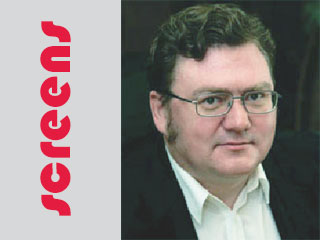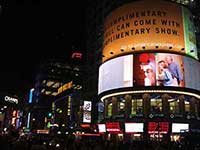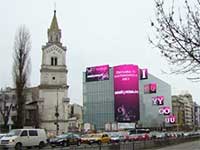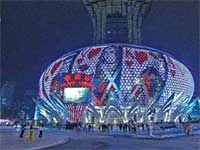Vladimir Krylov: To Be a Country of Intellectual Resources
The article offered to you is a reprint from the “Boss” magazine, a Russian monthly edition that writes about people with noteworthy contribution to the Russian economy. Vladimir Krylov, Chief Editor, magazine www.screens.ru gave an interview on current tendencies in the hi-tech field of nanotechnology. The intellectual concept of “Outdoor TV” that he patented nearly 10 years ago, he proposes to promote throughout the whole of Russia.
Corporation “Hope”
 Vladimir Krylov - Chief Editor, LED Screens magazine
Vladimir Krylov - Chief Editor, LED Screens magazinewww.screens.ru
Question: Dr. Krylov, LED is a nanoproduct. How do you evaluate Russian Government's attention to nanotechnologies and decision to create a corporation of nanotechnology.
It's a positive development. Nanotechnology is not just a fashionable topic. It's an indispensable tool for any country's economy. Nanotechnology will help save strategic energy resources, steer economy into future. Previously the efforts of various companies in that sphere were uncontrolled and uncoordinated. Now we have the real agency for managing projects in this field.
Question: Why couldn't have the existing Government agencies served this purpose?
The Department of Energy resources and other ministries are cumbersome, traditional, old structures operating on old stereotypes. They are incapable of immediate response to economy's pressure, of fast dynamics, of innovations. In the area of hi-tech everything changes every half year, sometimes faster. The interaction with “governmental monsters” here was unrealistic.
Question: Will not the Corporation turn to a bureaucratic state-controlled monopoly?
This will depend on the managers and structure: they need to rely on autonomous R&D teams to avoid the undesirable effect. Fortunately, this is a wholly new structure and it's not bound by old inflexible inter departmental relations. The whole world is investing billions of dollars into the nanotechnology only because energy consumption is an ever-increasing problem. This concerns not only governments and corporations, but every family in the world. Until recently RF Government was not interested in this field. Only large industrial groups like “Interros”, “AFK System”, and “Alfa-Group” kept research going. But these groups are also quite large and resemble governmental departments. While the top managers see the need to change and innovation, the drive stops on the level of middle management.
Question: Manufacture base in low cost areas. The components you use are made in the USA?
We are designing our system in Russia. LED screen is a complex system that utilizes hundreds of components with varying degree of “intellect”. Every year microchips and drivers are getting better and smaller. We need to coordinate new functions, algorithms, tasks. But we manufacture in low cost areas. Today we are using US chips, tomorrow these may be Japanese, later - Chinese. As designers, we have the “control stake”.
Question: The chip you need is not manufactured in Russia?
The production capacity for specialized chips in Russia is growing. For example, “AFK System” is building a factory near Moscow to manufacture chips for new electronic IDs. This area was selected because Russia remains world leader in cryptography. It's a synthetic branch of mathematics that is about 20 years ahead of “open” applied mathematics. Electronic IDs is an area of state interests that cannot be transferred to any third country.
Therefore, it's good that “AFK System” has undertaken to solve this problem. However, there are other areas where this industrial giant is unable operate effectively due its inflexibility.
Question: Does it mean the Russian Government should step in and organize manufacture of electronic components in Russia?
I believe this would be a mistake. The Government must control manufacture of products related to state security. In all other areas of economy, the dominating factor must be the cost of production. The cost must be competitive. If Government starts building factories that manufacture products above market prices, and the bureaucrats demand from local customers to use them, this will lead to economic collapse, to return to the communist-Russia command economy. The logic must be based on market considerations only. Russia may be the leader in developing nanotechnologies, but the manufacture must stay where labor cost is low.
New mass media
Question: What is new in the “Outdoor TV” approach?
When we started working on video screens, blue LED was not yet invented. Making full-color LED screens was impossible. So, we made our first video displays on incandescent lamps. We had a lot of competitors around the world, but none used the network approach. We were the first. Network of outdoor screens creates massive impact out-of-home, creates a new informational medium. We created a so called “Outdoor TV”.
Question: Is it the same as closed-circuit TV (CCTV)?
Outdoor TV is drastically different. At the time when standard TV broadcasting used analogue signals, we created a network based on digital signals using TCP IP protocols of the Internet. Also, video screen network spreads information through the whole city or different cities, thus achieving media coverage outdoor. Previously, people in transit stayed in an informational vacuum. The only source of information available was traditional outdoor advertising. But outdoor advertising is unable to reach the people and inform them of new events, emergencies, appeals from local authorities. Solving this problem was not easy.
Then we faced the problem of climatic zones. We install screens throughout the country: from Far East to Kaliningrad, from Black sea areas to extreme north like Norilsk. Pollution in large cities introduced corrections to design: we had to start changing filters every week rather than doing the expected monthly service. When we embarked on an Outdoor TV project we realized the need to protect screens from hacker-attacks.
A year ago the New York screen system was attacked, the screens were displaying uncensored and offensive information, and nobody could do anything about it for three days. Our system is guaranteed against all such attacks and unauthorized access. We are using coding and cryptographic protection of much higher security level that is available on the market. In fact, this again illustrates the ability of Russian engineers to consider any problem comprehensively, without leaving any loop-holes.
We have introduced ways to change refresh rate on screens, to protect screens from industrial interference, and solved other difficult technological problems. Probably, this was the reason why “Outdoor TV System” was awarded as the “Technology of the Year” at the state-sponsored Conference on “Informational Security”. Our technical laboratory is busy with orders from various manufacturers of LED products. Our technical expertise is considerable and we share it freely.
New thinking
Question: Today the Russian Government pays much attention to LED technology. The first deputy of the Prime Minister Sergey Ivanov recently commented on priorities in LED lighting…
He is right: by replacing incandescent lamps with LEDs the state will save billions of dollars on energy bills. LED lamps consume twice less energy, have much longer life span. However, the quality of LEDs is still unstable, even on factories of large manufacturers. LED is not our product, but as manufacturers of the final product we have to support the warranty.
However it's not enough to formulate the task; it's necessary to implement it. The situation is not as easy as it seems. To change the incandescent lamps will require change of cable lamps, power supplies, retraining of thousands of electricians. Another aspect is the resistance of companies that dominate the market of traditional lighting like Osram and Phillips. But the main stumbling block is unwillingness of middle management of government corporations to reform. The replacement of traditional lighting with LEDs will mean cutting energy spending by half. But the Moscow Energy Corporation is interested to sell as much as possible. Unexpectedly, we found allies in the Moscow Department of Education: they are willing to make the change to pay less for their huge energy consumption. Consider all the schools, colleges and other educational establishments in Moscow…
Dream team
Question: What should be the approach of Russian Government to science and technology?
The first trend is education: the number of colleges must be reduced to give way to vocational training. To create engineers and forget about trained qualified technical personnel is inadmissible. And this is the task for the Government; commercial structures are unable to bear the burden of educational expenses.
The second trend is integration of commercial structures with R&D centers. Russia has always been strong in development teams. Now is the time to merge the new nanotechnology corporation with work of these design bureaus, to coordinate practical and theoretical work, to make one team.
The third important task for the state is to support design teams through grants and setting up of science parks.
However, by far the most important task is to support medium size successful hi-tech teams by allowing them to work on nanotechnology projects. If we want the nanotechnology to be the advantage of the whole state (and not of individual private companies) the state must coordinate and control this field. This will automatically solve the problem of brain-drain. By offering a grant to a scientist, the state invests in future development and education. One must invest in teams; successful teams are not for sale.
Question: Would you say that we need to revive the “cult of physicists” in the semblance of Soviet times?
Definitely. These “physicists” never existed in isolation. There were teams of Kapitza, Kurchatov, Alexandrov and others. Several teams used to compete and work on the same projects at the same time. During the Second World War our different design bureaus were working on fighter and bomber planes: the competition was efficient, the teams were not fighting between themselves. Today, there are dozens if not hundreds of companies selling LED screens. But the companies involved in R&D are precious few.
Question: Yours is the only one?
Not the only one: previously there were 5-6 companies involved in development, now only 2-3.
Question: And the others have disappeared from the market?
No, they decided to take it easy and started re-selling ready-made foreign products. These companies will be unable to sustain competition for a long time, and will move to other market segments soon. But the most important: they do not help the country to move forward. However, the government treats simple resellers and R&D teams like ours in the same way. For us R&D is not fun, not an idle exercise. It's a strategy for long-term future development, for withstanding ever-growing competition from US or Japanese design teams. If we stop design work, our sales department will have nothing to sell, or will start reselling imported products like thousand other such companies.
We do not care if manufacturing is done in China or the USA, India or Iran. We will choose the best OEM manufacturer wherever it's better and cheaper. But our ideological advantage will promote our own reputation and that of Russia as well.
Question: How does R&D affect company profits?
Profits will be high if the solution offered to the market is comprehensive, if the team is capable to solve problems from various fields. Our products are complex. Look at the design of the airplane: you need a team of different engineers to work on engines, electronics, navigation etc. You need to coordinate efforts of various experts to make the plane fly. Engineers must be versatile, must know what happens in other areas affecting the project. Our engineers who design PCBs need to work closely with designers of plastic forms, computer experts developing software know a lot about our specific hardware requirements.
Question: Where did you find people for such team?
Some served in various military establishments, some worked in defense factories… We cooperate closely with various colleges like Engineering Academy by Bauman, or Department of Mathematics of Moscow State University, or Moscow Aviation College. We invite students to work with us, select those who fit the best. There are other research teams in Russia who are capable to solve complex tasks. These teams lay the foundation for the technological advance of Russia. The State must identify priority tasks and create conditions for productive creative work of such teams. At present we practically have no contact with government institutions. Commerce takes away all the time and strength, no time to play bureaucratic games. We work with huge companies like Toyoda or Cree, but our government has no time to waste on us.
I think that Russia must become a country of scientists, designers, generators of ideas, and highly qualified workers. Russia must become a country of concentrated intellect. Why cannot we make this our national guideline? It's no fun living in a country of the poor; it's time to make this country of qualified personnel and well-to-do middle class. Then Russia will be an exported of ideas and the main powerhouse of technical innovation.
We have all we need for this: we just need some political will to turn this into reality...





